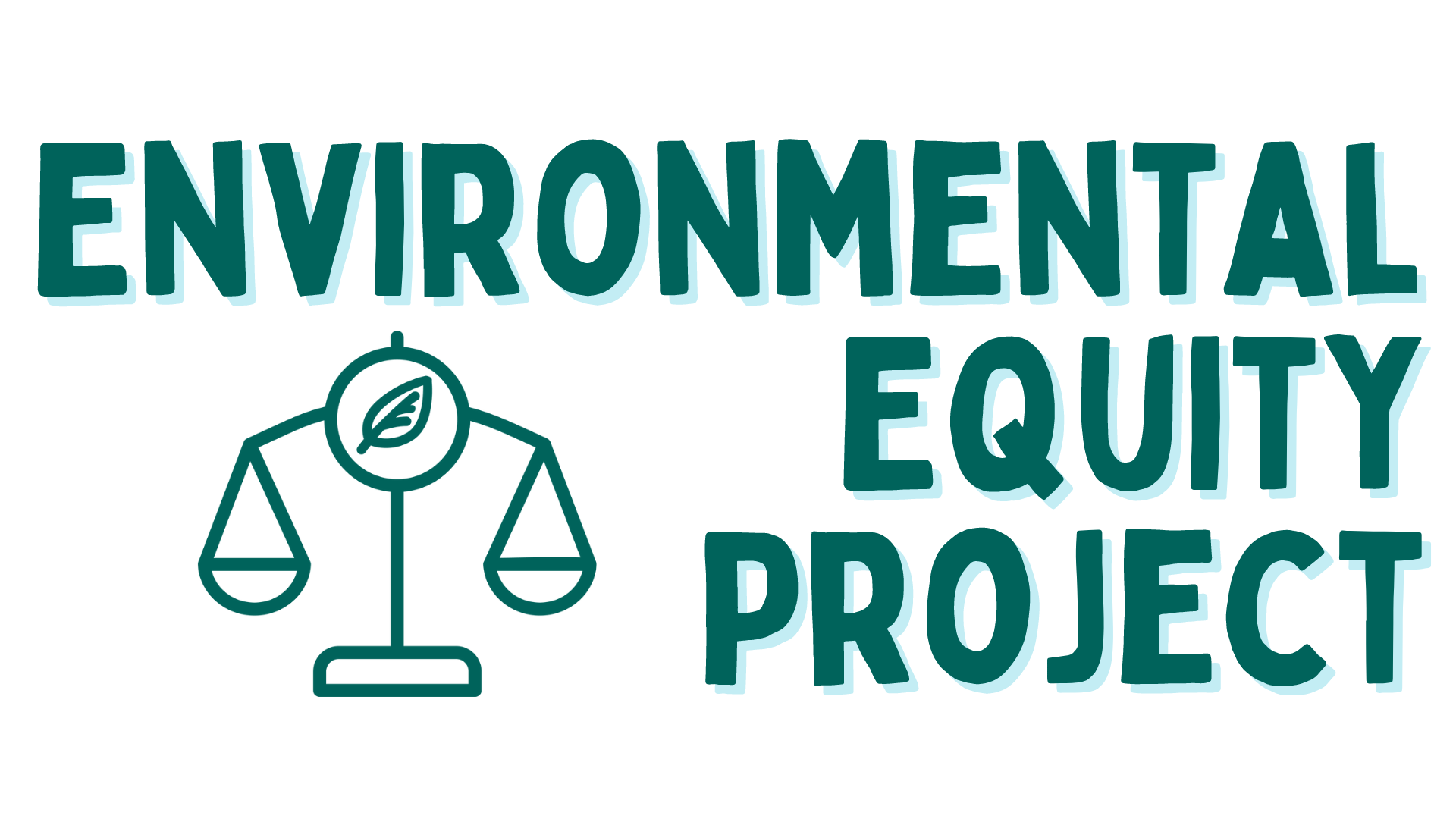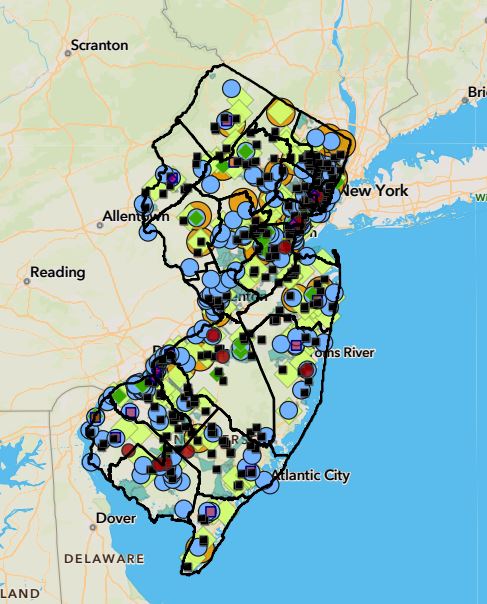
Navigating Environmental Equity in your community can be a daunting task when you don’t know where to start or what resources are available to you. The first step is gaining a basic understanding of what Environmental Equity is, check out the “Education” section of the webpage to explore further. The next step is assessing your community and locating available resources for more information and services.
Maps are helpful when determining your proximity to industrial facilities, air/water quality and more. Our Environmental Equity Assessment tool allows you to use maps to better determine how equitable your community is. Nonprofits can also be valuable sources of information and support services, as can government agencies like the New Jersey Department of Environmental Protection.


Understanding your town’s environmental health is the first step to improving your community and creating a healthy space for all. Exploring different factors like air and water quality, access to green spaces, and local legislation via online resources and interactive maps can assist you in that objective. Every community has something to learn and share to create an equitable New Jersey. The tools below will help you better understand your town and the next steps to take.
When evaluating your community or addressing an Environmental Justice challenge, maps can be helpful tools that provide information on topics such as; air and water quality, land conservation, and overburdened community status.
Click on the map categories for available tools that can help you asses your community.
Air .Water .Green Spaces . Misc.In order to better understand the environmental health of your community and areas for improvement use the assessment below. After determining the Environmental Equity standing of where you live, explore the resources on the page to see what tools are available to assist your community on the path to Environmental Equity.
Non-profits can provide educational, advocacy, and practical tools to address Environmental Justice. If you have a concern or want to better understand how your community is affected by Environmental Injustice, the following list includes organizations that could be reliable resources. Click on the organization for more details.
New Jersey Future works to promote healthy, equitable, and sustainable communities across New Jersey.
The organization offers Strategic Services to communities to assist communities on their path to be healthy, safe, and equitable.
Learn more here.
The Association of New Jersey Environmental Commissions assists New Jersey based environmental commissions, community members, and local governments in protecting natural resources and promoting healthy communities.
The organization regularly hosts educational opportunities centered around Environmental Justice and empowers environmental commissions to investigate and address Environmental Justice concerns in their communities.
Learn more here.
They offer funding to municipalities and schools to promote sustainability, research and guidance to address sustainability issues and gain certification in their programs, and technical assistance to pursue energy efficiency and more.
Greater Newark Conservancy fights environmental injustice in Newark and is an invaluable source for education, green space, and advocacy.
They host public meetings and awareness programming centered on environmental justice topics happening in Newark.
Learn more here.
Ironbound Community Corporation is a strong advocate for environmental equity in Newark. They were founded on the principles of “Justice and Equality For All”.
Ironbound Community Corporation works directly to address environmental justice concerns and seek to educate the community. They offer environmental justice bus tours of Newark.
Learn more here.
Isles is a community organization based in Trenton that fosters self-reliant, healthy, and sustainable communities.
They offer an abundance of resources focused on environmental education, climate action, and building healthy communities.
Learn more here.
CATA is a farmworker support committee that works to support worker’s rights, immigration, and food justice.
They provide support and assistance via education and outreach. They host affordable farmer’s markets, and a Youth Food Justice Crew program that offers a stipend to participants.
Learn more here.
Jersey Water Works is a collaboration of environmental organizations focused on clean water.
They provide people with guides, tool kits, case studies, fact sheets and more to promote education and advocacy.
Learn more here.
The American Littoral Society cares for the coast through advocacy, conservation, and education.
Currently, they offer opportunities to those in overburdened communities through initiatives like Swimmable Accessible Fishable Equitable (SAFE) which helps to mitigate systemic water problems such as flooding and combined sewage overflow.
Learn more here.
Sewage Free Streets and Rivers works to address the issue of combined sewage overflow (cso) in New Jersey communities and its impacts on health and wellbeing.
Sewage Free Streets and Rivers recognizes that overburdened communities are often the ones most affected by flooding and sewage overflow. They host educational programs that offer stipends to people in overburdened communities that are facing the impacts of sewage overflow and empower community members to take action.
Learn more here.
Musconetcong Watershed Association (MWA) brings together organizations and individuals dedicated to protecting and improving the Musconetcong River and watershed. Their mission is accomplished through public education, river water quality monitoring, and promotion of sustainable land management practices.
MWA is currently working with EPA on a major site of Per- and Polyfluoroalkyl substances (PFAS) aka forever chemicals in Washington Township, Warren County. This contamination was due to decades of sludge dumping on farms that contained chemicals from a textile manufacturing plant. The PFAS are infiltrating wells and groundwater, and is now being tested at the site and in the Musconetcong River.
Learn more here.
Moms Clean Air Force is a national organization with local state chapters. They are community members dedicated to fighting air pollution and advocating for climate justice.
They run several initiatives with a focus on Environmental Equity. EcoMadres is an initiative that brings together Latina moms to address air quality and other concerns that are affecting latino families. Their Community Health Equity program is dedicated to addressing environmental justice concerns in black communities and empowering community members to take action. They also work with indigenous communities across the country to address the ways indigenous families are impacted by environmental concerns.
Learn more here.
NJ Clean Cities Coalition is dedicated to advocating for clean energy in New Jersey. The focus on alternative energy sources to help promote better air quality.
They have launched the Trenton E-Mobility project that is providing electric car and van service to underserved communities in Trenton. These vehicles can be used for ridesharing and shuttle services. As the project develops electric vehicle charging stations will be installed across the city.
Learn more here.
New Jersey Conservation Foundation is dedicated to preserving land and natural resources, granting the public access to green spaces, and advocating for environmental justice.
They continuously work to pass legislation to secure and protect green spaces for environmental justice communities.
Learn more here.
The Pinelands Preservation Alliance is dedicated to protecting the Pinelands of New Jersey and empowering people to explore green spaces. Their program Access Nature NJ empowers individuals with disabilities to advocate for accessibility in order to explore natural spaces in New Jersey. They hold quarterly Zoom meetings to give a space for those with disabilities to express their concerns and experiences.
They offer accessible trips through Pinelands Adventures and have organized a statewide nature accessibility effort called Nature: Access for All.
Pinelands Preservation Alliance also works to break down barriers through the universal language of food with its Roots to Prevention program. Pinelands Preservation Alliance believes that ensuring equitable access to fresh, chemical free vegetables is a critical to the protection of our environmental as a whole. Investment in food equity creates new opportunities and connections between people, nonprofit organizations and stakeholders to further the cause of a healthy environment for people, plants and animals in the Pinelands region.
Earthjustice is a national organization that fights to protect the environment and advocate for community members facing the impacts of climate change.
They offer legal support for those fighting for clean air, clean water, and those experiencing the negative health impacts of environmental damage.
Learn more here.
New Jersey Institute for Social Justice is committed to advocating for racial and social justice for communities of color across New Jersey.
Learn more here.
Eastern Environmental Law Center is a non-profit, public interest, environmental law firm based in Newark. The firm is dedicated to supporting communities in their efforts towards Environmental Justice.
The firm assists overburdened communities on topics including but not limited to air quality and land rights for Native Americans.
Learn more here.
Legal Services of New Jersey is dedicated to providing legal support to low-income individuals and communities across New Jersey.
They are committed to assisting low-income communities that are disproportionately impacted by climate concerns and Environmental Injustices
Learn more here.
Government agencies offer information and support to people experiencing Environmental Injustice. If you have concerns about Environmental Injustice in your community and have consulted with local non-profits, the next step may be contacting local, state, or federal government to express your concerns.
Getting in contact with your local government can be helpful when dealing with environmental justice concerns. Exploring your town’s government website can help direct you to the right place.
This helpful tool allows you to find your mayor’s contact information.
Learn more here.
The New Jersey Department of Environmental Protection works to protect the environment and public health throughout the state of New Jersey. They are committed to Environmental Equity.
Storm water: https://dep.nj.gov/cleanwaternj/
Air: https://dep.nj.gov/airquality/
Climate Change: https://dep.nj.gov/climatechange/
Green Spaces: https://dep.nj.gov/greenacres/
Water Quality: https://dep.nj.gov/dwq/
The Environmental Justice section of their website offers an array of tools and information related to Environmental Justice in the state.
Learn more here.
The New Jersey District of the U.S. Department of Justice upholds the law and protects civil rights. This includes Environmental Justice and the rights associated with it.
You can report Environmental Justice concerns directly to their offices via email, in-person, or phone.
Learn more here.
The Environmental Protection Agency is a national agency focused on protecting human health and the environment. They work to ensure all communities have clean air and water.
To report an environmental hazard or human health concern you can fill out a quick and easy form on their website.
Learn more here.
The U.S. Department of Housing and Urban Development oversees federal housing and development laws. They work to ensure communities are safe, affordable, and sustainable.
They work with traditionally underserved communities like tribal and low-income communities to find safe and affordable housing. One of their goals is improving equity in community planning.
Learn more here.
Reliable resources are an important step on the way to equity. However, to gain the tools to make a difference, a fundamental understanding of Environmental Equity and learning from what others have done are equally essential. Explore the Environmental Equity section of this site to explore what it is and what is being done across New Jersey to create environmentally equitable communities.
Reach out to let us know if this page has been helpful or if you think something is missing.
